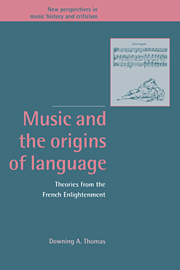Book contents
- Frontmatter
- Contents
- Acknowledgements
- Introduction
- 1 Music and language
- 2 Origins
- 3 Music theory and the genealogy of knowledge in Condillac's Essai sur l'origine des connaissances humaines
- 4 Music and original loss in Rousseau's Essai sur l'origine des langues
- 5 Sensible sounds: music and theories of the passions
- Conclusion
- Bibliography
- Index
4 - Music and original loss in Rousseau's Essai sur l'origine des langues
Published online by Cambridge University Press: 15 December 2009
- Frontmatter
- Contents
- Acknowledgements
- Introduction
- 1 Music and language
- 2 Origins
- 3 Music theory and the genealogy of knowledge in Condillac's Essai sur l'origine des connaissances humaines
- 4 Music and original loss in Rousseau's Essai sur l'origine des langues
- 5 Sensible sounds: music and theories of the passions
- Conclusion
- Bibliography
- Index
Summary
Rousseau did not stop at the first ideas that Condillac's writings had inspired in him: his mind, always active, criticized them, corrected them, transformed them. Duclos' Remarques, which had just appeared, suggested still others. He expounded them with satisfaction. And preoccupied with the problems that he had examined in his Discours, he even devoted a large part of the Essai to his conceptions of the state of nature and of the first epochs of humanity. From this triple inspiration has arisen a slightly confused and badly digested work.
The Essai sur l'origine des langues, as a reflection on both language and music, holds a unique position in the work of a writer who was also music theorist and composer. In addition to a Projet concernant de nouveaux signes pour la musique – a proposal to simplify musical notation by eliminating the traditional staff and its symbols – Rousseau wrote the music articles for the Encyclopédie, published a widely read Dictionnaire de musique, and composed operas, motets, and chansons.
Reflections on music are also scattered throughout Rousseau's fictional and non-fictional writings. The Discours sur l'origine de l'inégalité, La Nouvelle Héloïse, Emile, and the Confessions all include references (from relatively brief digressions in the second Discours, to rather extensive passages in the Confessions) to music and/or music theory. The particular complexity of the Essai's intertwining of reflections on music, language, society, and political systems has left many critics perplexed.
- Type
- Chapter
- Information
- Music and the Origins of LanguageTheories from the French Enlightenment, pp. 82 - 142Publisher: Cambridge University PressPrint publication year: 1995



